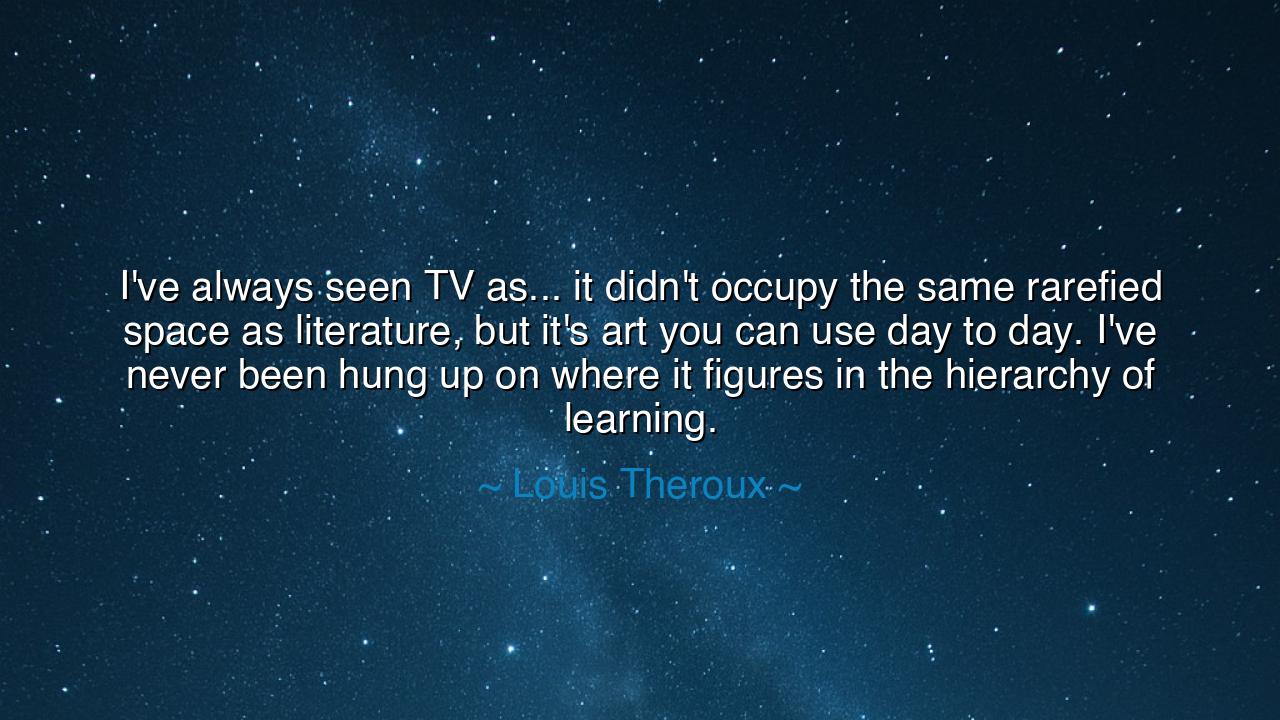
I've always seen TV as... it didn't occupy the same rarefied
I've always seen TV as... it didn't occupy the same rarefied space as literature, but it's art you can use day to day. I've never been hung up on where it figures in the hierarchy of learning.






When Louis Theroux said, “I've always seen TV as... it didn't occupy the same rarefied space as literature, but it's art you can use day to day. I've never been hung up on where it figures in the hierarchy of learning,” he was speaking as both a craftsman and a philosopher of the modern age. In his voice we hear the humility of one who honors truth wherever it hides — in books, in films, in streets, or in screens. Beneath his words lies a deeper wisdom: that art is not measured by its pedestal, but by its power to awaken, to question, and to connect. For the ancients taught that every form of expression, when born from sincerity and insight, is a mirror for the human spirit.
The origin of this reflection lies in Theroux’s life as a documentarian — a man who has walked among prisoners, cult members, politicians, and the forgotten corners of society. Through the lens of television, he sought not to entertain but to understand. To him, TV was not a trivial medium, but a living dialogue between storyteller and audience, a bridge between experience and empathy. He saw that while literature may carve wisdom into words for the generations, television has the power to cast that same wisdom into the immediacy of daily life — to show faces, voices, and realities that otherwise remain unseen.
In his statement, Theroux dismantles the old hierarchies of learning, the rigid belief that wisdom can only be found in the classical forms — in books, academia, or the so-called “high arts.” His insight echoes a timeless truth: that knowledge wears many faces. Just as the Greeks learned through the theater and the Romans through public oratory, so too do modern minds learn through the light and sound of the screen. What matters is not the medium, but the message — not the form of expression, but the depth of awareness it awakens in those who witness it.
There is a story that mirrors this truth. When the great artist Leonardo da Vinci was asked to justify his sketches of common people — workers, beggars, and street vendors — he replied that beauty lies not only in the ideal but in the real. He painted kings and peasants with the same reverence, because all reflected the divine intricacy of life. So too does Louis Theroux approach television: not as a lesser art, but as a mirror held up to the living world. He reminds us that truth, when rendered with care, does not need marble halls to shine — it can glow even through the electric pulse of a humble screen.
The meaning of his words, therefore, is a call for open-mindedness. The pursuit of wisdom must not be confined by arrogance or elitism. To scorn television because it is “common” is to forget that knowledge is not reserved for the few — it is meant for all. The philosopher who meditates beneath a tree and the journalist who records life in motion both serve the same purpose: to help humanity see itself more clearly. Art you can use day to day is not lesser — it is essential. It is the art that teaches us empathy in the grocery store, understanding at the dinner table, reflection in the quiet hours of the night.
The lesson is this: do not measure art by prestige, but by purpose. Let every encounter — a film, a conversation, a documentary, a melody on the street — become a teacher. Learn from the humble as eagerly as from the exalted. The wisdom of the modern world hides not in temples or libraries alone, but in the flicker of a story that moves you, in the voice of a stranger who reveals something you did not know you shared. For every form of storytelling, when approached with truth, is a thread in the vast tapestry of understanding.
Thus, Louis Theroux’s words remind us that the sacred is not found only in the high halls of culture, but in the daily acts of seeing, listening, and learning. Television, though born of machinery, becomes holy when it carries empathy. Literature, though ancient, remains alive when it continues to move hearts. And in this harmony between the lofty and the ordinary, the past and the present, the written and the visual, lies the true spirit of education — not as hierarchy, but as communion. So let us learn from all things, and hold no art too humble to enlighten the soul.






AAdministratorAdministrator
Welcome, honored guests. Please leave a comment, we will respond soon